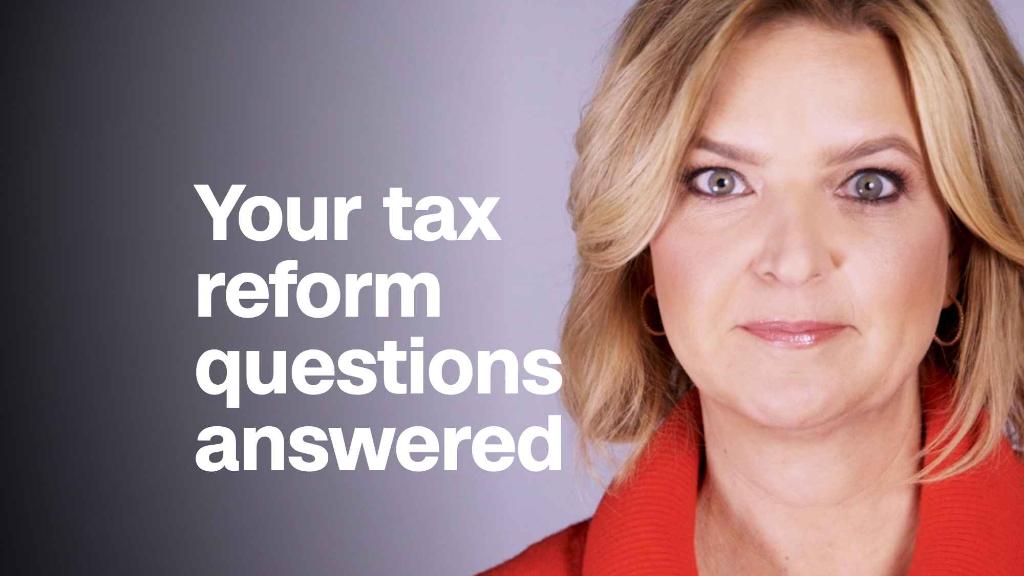
We asked CNN readers and viewers to share their questions about the massive tax plan that just become law, and received more than 2,000 questions.
Lots of people asked us how the new law would affect them. That's a more complicated question than it might seem. There are a million factors that determine what your tax bill will be (well, not really a million, but you get it). To figure that out, our tax calculator is a good place to start.
But to really understand what the bill means for you, you have to dig in. We'll be here to help: Our coverage of the tax overhaul will continue in the weeks and months ahead.
To start, here are answers to some initial questions about mortgages, student loans, when the new law kicks in and more.
When will the tax law go into effect?
First off: The soon-to-be tax law will not apply to your 2017 taxes -- the ones you have to file this coming April.
Most provisions of the new law affecting individuals and businesses go into effect on Jan. 1, 2018. For instance, new tax brackets take effect on January 1 of next year, as will the new standard deductions.
But not all of them do. Changes to tax deductions for alimony payments, for instance, will kick in for divorces that happen after December 31, 2018. And the penalty for not having health insurance will be eliminated in 2019.
And some provisions affecting individuals will be very short-term. The bill expands the medical expense deduction just for 2018 and 2019, for example.
Related: New tax brackets for 2018
I'm confused as to what exactly expires in 2025.
Most of the corporate provisions are permanent. But most of the changes that affect individuals will expire after Dec. 31, 2025, or 8 years from now. Whether or not they're extended beyond then will be determined by a future Congress.
Related: What's in the GOP's final tax plan
How does this new bill change the AMT calculation?
It doesn't change the calculation -- it's still complicated under the new bill for individuals. So much for simplification! But it does raise the amount of income that would be exempt when you calculate taxable income under AMT rules. For singles the exemption level will increase to $70,300 -- up from $54,300. And for married couples filing jointly it increases to $109,400 -- up from $84,500.
Is my mortgage deduction the same as before?
Short answer: No.
Under the new law, if you take out a new mortgage you will only be allowed to deduct the interest on debt up to $750,000, down from $1 million today. Keep in mind that homeowners who already have a mortgage will not be affected by the change.
Related: Homeowners: Here's what's in the tax bill for you
Homeowners should also know that taxpayers may no longer be able to deduct all state and local property taxes plus income or sales taxes. Instead, the legislation allows individuals to deduct up to $10,000 in property taxes and state and local income or sales taxes.
You will still be able to exclude up to $500,000 (or $250,000 for single filers) from capital gains when you sell your primary home, as long as you've lived there for two of the past five years.
Is the $10,000 limit for state and property tax deductions really the same for a single filer as for joint filers?
Yes. Under the new legislation, regardless of whether you're single or married, you're not allowed to deduct more than $10,000 of property taxes and state and local income or sales taxes.
What will happen with the student loan interest deduction?
The student loan interest deduction remains the same, so taxpayers will still be allowed to claim a deduction of up to $2,500 for the interest they pay on student loans each year.
Related: Tax bill and your tuition: Here's what to expect
Is the tuition waiver still in place for graduate students?
Yes. The bill spares graduate students from having to pay income tax on tuition waivers -- something that was proposed in the House version of the bill.
Is the child care credit the same?
The GOP's tax overhaul bill doubles the current child tax credit from $1,000 to $2,000 per child under age 17. It also lets parents collect a refund of up to $1,400, up from the current $1,000, if the credit is larger than their federal income tax liability.
Related: Changes to the child tax credit: What it means for families
The credit will be available to high earners for the first time. It raises the income threshold under which filers may claim the full credit to $200,000 for single parents -- up from $75,000 -- and to $400,000 for married couples -- up from $110,000.
Related: 34 things you need to know about the incoming tax law
Please explain the pass-through provision as it pertains to partnerships and LLCs.
We'd love to, but even tax experts are still trying to figure out all the implications. This is one of the most complex changes in the new law.
Generally speaking, though, the tax burden on owners, partners and shareholders of S-corporations, LLCs and partnerships -- who pay their share of the business' taxes through their individual tax returns -- will be lowered thanks to a 20% deduction.
The 20% deduction will not be available to anyone in a service business -- unless their taxable income is less than $315,000 if married (or $157,500 if single).
Is a copy of the tax bill made open to the public?
Yes! You can read it here. If you have more questions, let us know.
